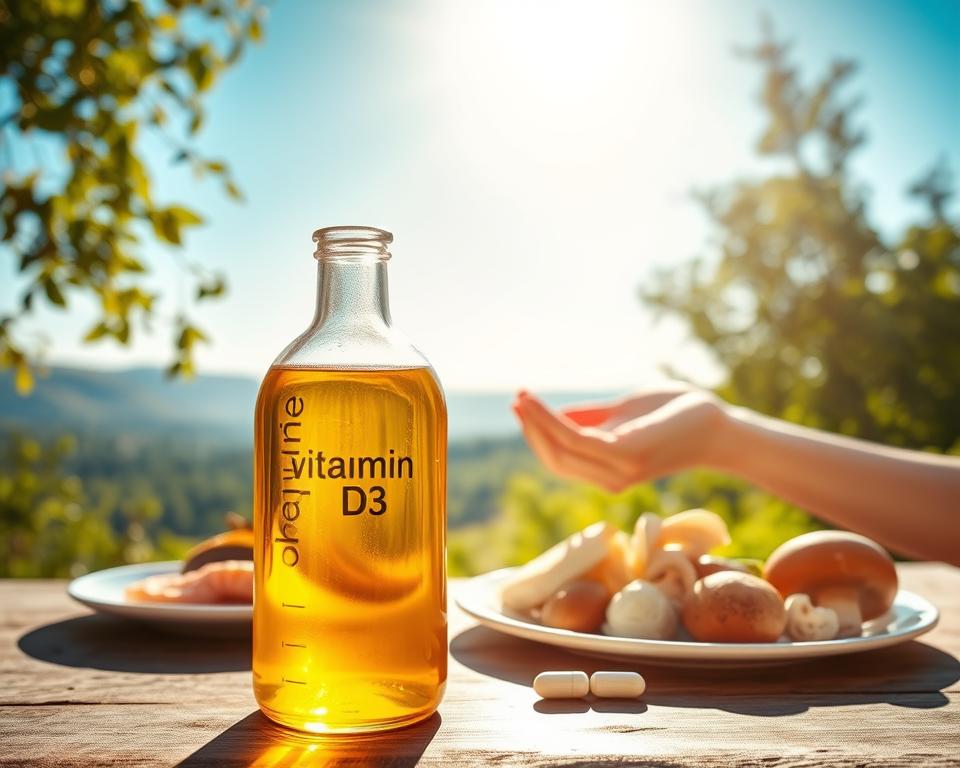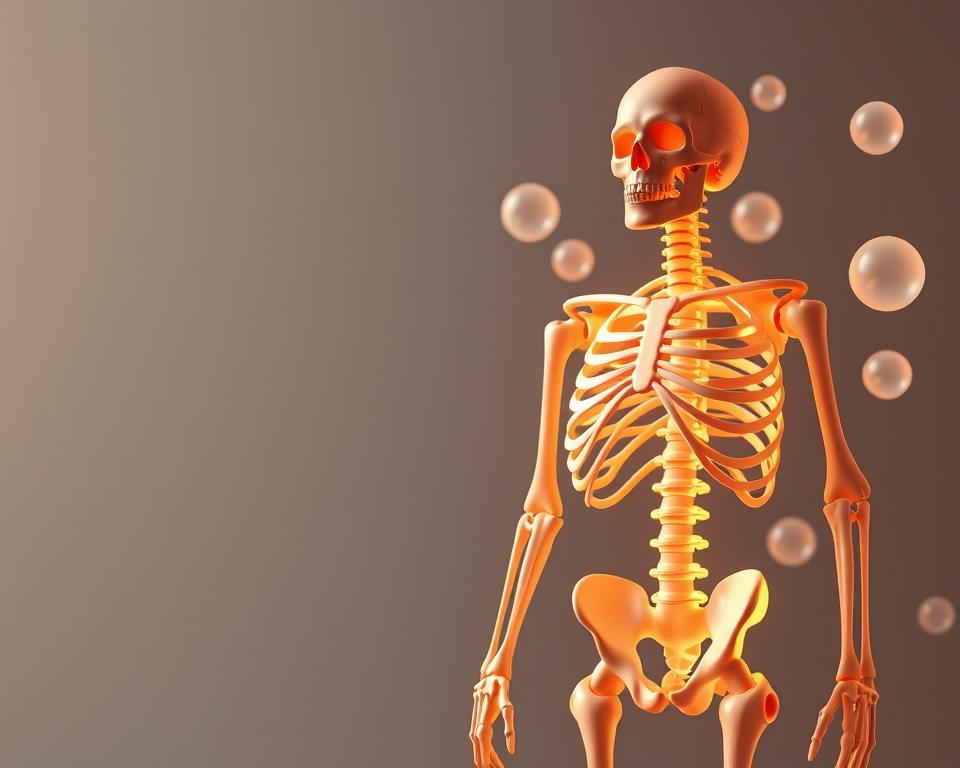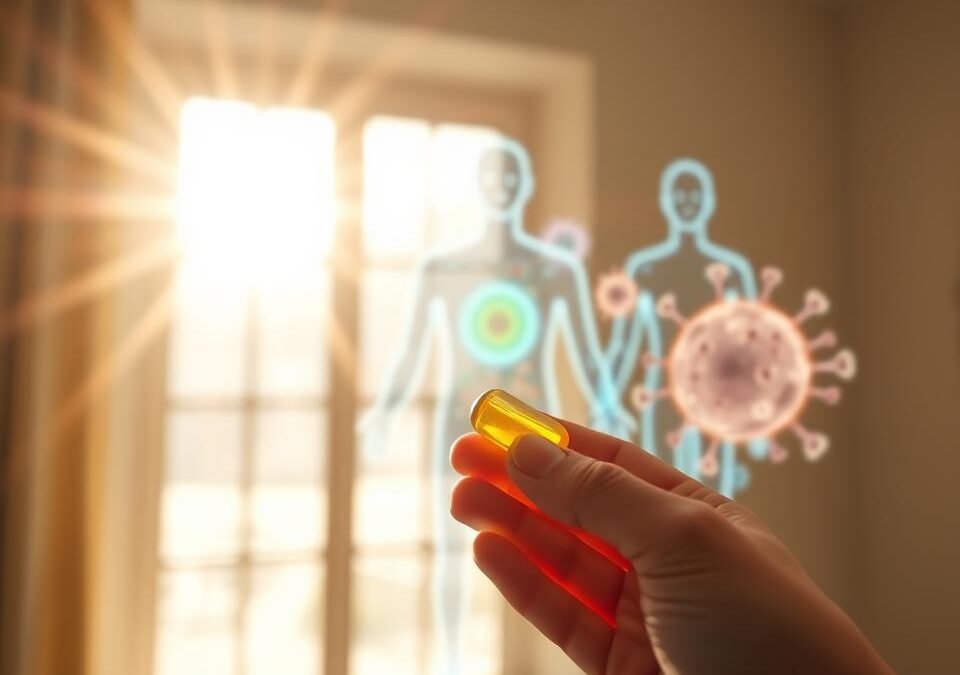As someone who cares about health, you know how important a key nutrient is. It helps keep your immune system strong, bones healthy, and mood good. This essential nutrient is vital for your overall health and resilience.
Getting the right amount can make a big difference in your health. Ray Baker says, “Get well and stay well.” Knowing how important it is can help you start feeling better.
Stay tuned as we dive deeper into this vital nutrient.
Understanding Vitamin D: The Sunshine Nutrient
Vitamin D is special because your skin makes it when you’re in the sun. It’s not like other vitamins that you get from food or pills.
What Is Vitamin D and How Does Your Body Process It?
Vitamin D is a fat-soluble vitamin. It helps keep your bones strong, your immune system working, and your overall health good. When your skin gets sunlight, it makes Vitamin D3 (cholecalciferol). Then, it goes to your liver and kidneys to become active.
The Vitamin D Conversion Process
The process of making Vitamin D has two steps. First, it gets hydroxylated in the liver to become 25-hydroxyvitamin D. Then, it gets hydroxylated again in the kidneys to become 1,25-dihydroxyvitamin D, the active form.
The Different Forms of Vitamin D (D2 vs D3)
Vitamin D comes in two forms: D2 (ergocalciferol) and D3 (cholecalciferol). D2 is in fungi and some plants. D3 is made in your skin when you’re in the sun and is also in some animal foods.

Vitamin D2 and D3 are different in where they come from and how well they work. Studies show that Vitamin D3 is better at keeping Vitamin D levels up in your body.
| Characteristics | Vitamin D2 | Vitamin D3 |
|---|---|---|
| Source | Fungi, some plants | Skin synthesis, animal-based foods |
| Effectiveness | Less effective | More effective |
The Essential Vitamin D Benefits for Overall Health
Vitamin D is very important for your health. It helps your body fight off sickness, keeps bones strong, and makes you feel good. Having enough Vitamin D is key to staying healthy.
Strengthening Your Immune System
Your immune system is like a shield against germs and sickness. Vitamin D helps keep this shield strong.
How Vitamin D Regulates Immune Response
Vitamin D controls how your immune system works. It helps prevent too much inflammation and fights off bad guys.
- Enhances pathogen-fighting ability
- Regulates immune cell activity
- Reduces risk of autoimmune diseases
Building and Maintaining Bone Health
Vitamin D is great for your bones. It helps your body use calcium, which is important for strong bones.
Calcium Absorption and Bone Density
Vitamin D helps your body use calcium from food. This keeps your bones strong. It also helps prevent bones from getting weak.

- Improved calcium absorption
- Enhanced bone density
- Reduced risk of fractures
Enhancing Mood and Mental Wellbeing
Vitamin D is also good for your mind. It can help with mood problems.
Vitamin D’s Role in Seasonal Affective Disorder
Seasonal Affective Disorder (SAD) is a kind of depression that happens in winter. When it’s dark, Vitamin D levels go down. Having enough Vitamin D can help with SAD symptoms.
The link between Vitamin D and mental health shows why it’s important to check your Vitamin D levels, even when it’s dark.
How to Get Adequate Vitamin D
It’s important to have enough Vitamin D for good health. There are many ways to get it. Start by learning about Vitamin D sources and how to add them to your day.
Sunlight Exposure: The Natural Source
Sunlight gives you Vitamin D. Your skin makes Vitamin D when it’s in the sun. But, how much you make depends on the sun’s strength, the time of day, and your skin color.
Safe Sun Exposure Guidelines
To enjoy the sun safely, follow these tips:
- Get outside for 10-15 minutes when the sun is strongest (10 am – 4 pm).
- If your skin is light, you might need less sun.
- Don’t stay in the sun too long to avoid getting burned.
Dietary Sources of Vitamin D
You can also get Vitamin D from food. Some foods have Vitamin D naturally, and others are fortified with it.
Dietary Sources of Vitamin D
Some foods are full of Vitamin D. Others have it because they’re been made to have it.
Supplements: Types, Dosages, and Recommendations
If sunlight and food aren’t enough, supplements can help. There are two kinds: D2 and D3.
Choosing the Right Vitamin D Supplement
When picking a Vitamin D supplement, think about these things:
- Type: D3 is better than D2.
- Dosage: Talk to a doctor to find out how much you need.
- Quality: Choose well-known brands that are known for quality.
Recognizing and Addressing Vitamin D Deficiency
Knowing about Vitamin D deficiency is key for good health. It can cause big problems if ignored. Spotting the signs early helps keep Vitamin D levels right.
Common Signs and Symptoms of Deficiency
Vitamin D deficiency shows in many ways, making it hard to spot. You might feel tired, weak, or have bone pain. Mood swings, like feeling sad or anxious, can also happen.
Key symptoms to watch out for:
- Frequent illnesses, as Vitamin D plays a role in immune system regulation
- Fatigue and muscle weakness, impacting daily activities
- Bone pain or tenderness, specially in the back or joints
- Mood changes, including depression or anxiety
Risk Factors for Vitamin D Deficiency
Some things make you more likely to have low Vitamin D. Not getting enough sun, having darker skin, and being older are big risks. Certain health issues, like celiac disease or Crohn’s disease, can also affect how well you absorb Vitamin D.
High-Risk Populations
Some groups face a higher risk of Vitamin D deficiency. These include:
- Older adults, due to reduced skin synthesis and less sun exposure
- Individuals with limited sun exposure, such as those who are homebound or work indoors
- People with darker skin, as melanin reduces Vitamin D production from sunlight
- Individuals with certain medical conditions affecting Vitamin D absorption
Testing for Vitamin D Levels
If you’re at risk or feeling symptoms, getting your Vitamin D levels tested is a good idea. The 25-hydroxyvitamin D test is the best way to check. Your doctor can suggest this test and explain the results to help decide what to do next.
| Vitamin D Level (ng/mL) | Status | Recommended Action |
|---|---|---|
| Less than 20 | Deficient | Supplementation and increased sun exposure |
| 20-29 | Insufficient | Lifestyle changes and possible supplementation |
| 30 or higher | Sufficient | Maintain current habits |
Potential Risks of Excessive Vitamin D
Too much Vitamin D is bad. It can cause too much calcium in the blood, leading to nausea, vomiting, and weakness. Always talk to your doctor before taking supplements to stay safe.
Conclusion: Incorporating Vitamin D Into Your Wellness Routine
Vitamin D is key for your health. It boosts your immune system and helps your bones. It also makes you feel better.
Now you know Vitamin D is important. It’s time to add it to your daily routine. This will help you stay healthy.
Start by getting outside in the sun. Eat foods rich in Vitamin D. If needed, take supplements. These steps will help you keep Vitamin D levels right.
By focusing on Vitamin D, you’re caring for your health. Stay healthy, Ray Baker.


